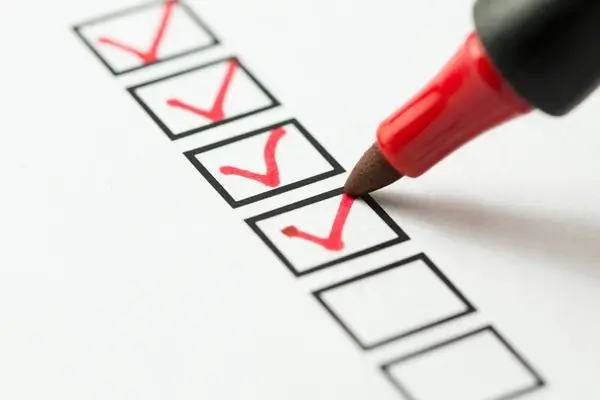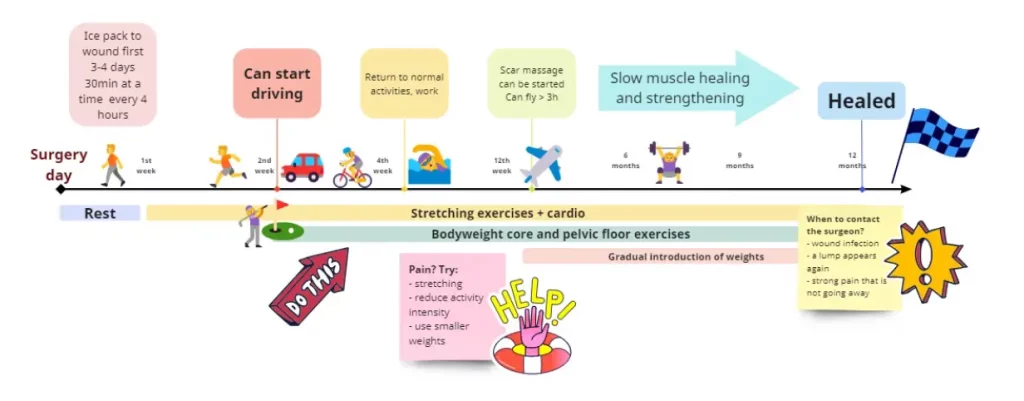Recovering from hernia surgery requires patience, self-care, and attention to detail when following the post-surgery recovery plan.
This step-by-step guide aims to help get you back to your everyday activities with minimal discomfort. Remember, everyone’s recovery looks different, so be sure to consult your doctor or surgeon for personalised advice.

Private hernia surgery at a glance:
- Surgery within 4-6 weeks
- Costs £3,299
- Available at a range of our UK locations
- Finance options available
Call us on: 0333 060 6126
Wellsoon private healthcare
Wellsoon is a service from Practice Plus Group that provides a range of treatments for patients paying for themselves or paying by private medical insurance. With no hidden costs, you’ll pay less than you might think and be back to your best sooner than you thought.
- £95 consultation within 1 to 2 weeks* – includes x-ray, bloods and swabs
- Surgery in just 4 to 6 weeks*
- Experts in hips, knees, eyes, hernias and more
- Pay for yourself or via health insurance
- 0% finance options available

Hernia operation recovery time
So, the first question most patients have is how long does it take to recover from hernia surgery?
The answer varies depending on several factors. These include:
- the type of hernia surgery you have
- your overall health
- how closely you follow post-operative instructions.
Generally, you should be able to return to your normal activities around four to six weeks after the procedure.
In most cases, you’ll be able to go home on the same day as your surgery. Our team will give you advice and support to ensure that your hernia repair surgery heals properly. We usually do not need to see you after the operation but will give you a call to make sure you are recovering well.
Recovering from open hernia surgery vs laparoscopic surgery
During open surgery, a hernia surgeon will make an incision over your hernia. He or she will then push the protruding tissue back through the muscle.
Laparoscopic inguinal hernia repair (also called keyhole surgery) is when a surgeon passes an instrument called a laparoscope through the abdominal wall. This is done via small incisions. Due to the smaller entry point, recovery from laparoscopic hernia surgery is generally quicker compared to traditional open surgery.
Hernia surgery recovery time for elderly patients
Hernia treatment recovery time tends to be slower in elderly patients due to age-related factors. Older patients may need to spend longer in hospital and may feel more fatigue during the recovery process. However, this is largely dependent on your overall health and adherence to your recovery plan.
Hernia surgery recovery timeline
Here’s a general timeline for the different stages of the recovery period for a hernia operation:

One – two days after surgery
90% of all hernia surgeries are day-cases. This means that the vast majority will be discharged from hospital on the same day as their surgery. Soreness and discomfort around the affected area is common.
The first week after surgery
The initial days following surgery may involve some discomfort, pain, and limited mobility. Pain medication will be prescribed by your doctor if appropriate.
You should focus on rest and gentle movement to prevent stiffness and improve blood circulation. Strenuous activities and lifting heavy objects should be avoided. However, walking is encouraged if the pain allows.
Two – four weeks after surgery
Most people can return to light activities around 14 days post-surgery. Intense physical work should still be avoided.
Pain and discomfort should gradually subside and you might require fewer doses of pain medication. Your incision site should be healing nicely but remember, it’s important to continue following proper wound care instructions.
You can return to driving if you can perform an emergency stop without experiencing pain in the affected area.
Four – six weeks after surgery
By this point, many patients will be able to resume the daily activities they enjoyed before surgery. Be sure to listen to your body and consult your doctor or nurse.
Light exercise like walking can help improve overall fitness without straining the healing incision site.
Six – eight weeks after surgery
Depending on the type of surgery you had and your recovery progress, your doctor may advise more moderate exercises. These include cycling, golf, and light jogging.
By this time, the incision site should be well-healed. You should continue to monitor it for any signs of infection or complications.
You should be able to return to work if your job involves limited physical activity.
Two – three months after surgery and beyond
By this stage, most people are well on their way to a full recovery. You can increase the intensity of your physical activities, under the guidance of your doctor.
Remember that everyone’s healing process is unique. It’s essential to listen to your body and follow your doctor’s advice.
Hernia surgery recovery tips
Follow the tips below to speed up your recovery from hernia surgery:
- Book your travel home from hospital: Initially, you won’t be able to drive. Getting someone to drive you back from your operation (or booking a taxi) is recommended
- Plan for assistance: You will need to arrange for a friend or family member to stay with you for the first 24 – 48 hours after surgery. You won’t be able to lift anything, so getting help with everyday activities like shopping will prove invaluable
- Create a recovery space: Set up a comfortable area with pillows and blankets with easy access to essentials
- Follow medical instructions: Adhere to your surgeon’s advice regarding medication, wound care, and physical limitations
- Stay informed: Educate yourself about potential complications of hernia surgery and know when to seek medical attention if you notice any unusual symptoms
- Attend follow-up appointments: Attend all scheduled follow-up appointments with your doctor. These visits are essential for tracking your progress and addressing any concerns you may have
- Manage pain and discomfort: Take prescribed pain medications as directed. Report any severe or worsening pain to your doctor
- Monitor your incision site: Keep the incision site clean and dry. Follow your doctor’s instructions for changing dressings and cleaning the wound to prevent infection
- Exercise safely: Walking and gentle exercise are recommended, but only a few weeks after surgery. Be sure to ask your doctor for more information before starting to exercise
- Practice relaxation techniques: Deep breathing, meditation and gentle stretches can help alleviate stress and pain
- Eat healthy foods: Begin with light, easily digestible foods and slowly reintroduce your regular diet. Eating food high in fibre along with plenty of fruit and vegetables will help avoid the risk of constipation
- Stay hydrated: Drink plenty of water to support healing and prevent dehydration. This can impede your recovery process
- Listen to your body: Pay attention to how your body responds to activities. If you experience pain, discomfort, or fatigue, be sure to take a break and rest
- Avoid tight clothing: Choose loose-fitting clothing that won’t put pressure on the incision site and allow for comfortable movement
- Prioritise emotional well-being: Recovery can be challenging both physically and emotionally. Seek support from loved ones or consider counselling if needed
- Rest: Give your body the rest it needs to heal. Prioritise getting enough sleep and avoiding unnecessary stress
- Maintain proper posture: Support your abdominal area when sitting, standing, or moving to prevent strain
The best exercises to recover from hernia surgery
Exercising after hernia surgery can benefit your recovery. However, it’s important to choose exercises that don’t strain the surgical site. Always consult your doctor before starting a new exercise routine.
The following exercises are generally considered safe to do during hernia surgery recovery:
Walking
Walking is a low-impact exercise. It promotes blood circulation, helps prevent blood clots, and encourages overall healing. Start with short walks around your home and gradually increase the duration and intensity.
Deep-breathing exercises
Controlled deep breathing can help prevent complications and improve lung function. Take slow, deep breaths and exhale slowly.
Pelvic floor exercises
Gentle pelvic floor exercises can help strengthen the muscles in the pelvic region without putting strain on the abdominal area.

Leg raises
While lying down, gently lift one leg at a time while keeping your abdominal muscles engaged. This can help maintain lower body strength.
Ankle pumps and circles
While lying down or sitting, move your ankles in circles and perform ankle pumps. This will help improve blood circulation and prevent blood clots.
Arm and shoulder exercises
Gentle arm and shoulder movements (such as lifting your arms overhead or doing simple arm circles) can help maintain upper body mobility.
Seated marches
While sitting, alternate lifting your legs in a marching motion to engage your lower body muscles without stressing the abdominal area.
Yoga or gentle stretching
If approved by your doctor, consider gentle yoga poses or stretching routines that focus on flexibility and relaxation. Avoid poses that strain your abdominal muscles.
Resistance band exercises
Once your doctor approves, you can use resistance bands for gentle exercises that target various muscle groups. They should avoid putting excessive strain on the surgical area.

Precautions after hernia surgery
After hernia surgery, there are several things you should avoid to ensure a smooth and successful recovery:
- avoid lifting heavy objects or straining your abdominal muscles to prevent hernia recurrence
- refrain from intense workouts or activities that involve twisting and bending until your doctor gives you the green light
- you may need to avoid driving until your doctor approves. Sudden movements or emergency braking can strain your abdominal area and disrupt the healing process. There may also be legal implications to getting back behind the wheel after hernia surgery. Check with your insurance provider for more information
- smoking can impair the healing process and increase the risk of infection. It’s best to avoid smoking during your recovery
- alcohol can interfere with medications and affect healing. Avoid alcohol until you receive clearance from your doctor
- if possible, avoid activities that trigger forceful coughing or sneezing, as these actions can strain the surgical area
- balance your sitting and standing activities to prevent strain on the abdominal area. Take regular breaks to move around.
When to seek medical attention after hernia surgery
After hernia surgery, it’s important to be aware of potential complications and to know when to seek medical attention. If you experience any of the following symptoms or situations, contact your doctor or medical team promptly:
- Severe pain: While some discomfort is normal after surgery, severe or worsening pain could indicate a problem. These can include infection, hernia recurrence, or internal bleeding
- Fever: A fever could be a sign of infection. If your temperature is consistently above 38°C
- Redness, swelling, or drainage: If you notice increased redness, swelling, warmth or discharge around the incision site, it could indicate an infection
- Difficulty breathing or chest pain: These symptoms could suggest complications and require immediate medical attention
- Persistent nausea and vomiting: If you continue to experience severe nausea and vomiting, it could indicate a bowel obstruction or other complications
- Inability to pass gas or have a bowel movement: This could signal potential bowel obstruction
- Change in incision appearance: in the event the incision becomes increasingly painful, opens, or shows signs of infection such as pus or a foul odour
- Hernia symptoms: If you experience symptoms similar to those you had before surgery, such as worrying hernia pain, bulging or discomfort, it might indicate hernia recurrence
- Unusual reactions to medications: If you experience severe side effects or allergic reactions to any prescribed medications
- Sudden onset of weakness or numbness: This could indicate nerve damage or other complications
- Worsening fatigue: While some fatigue is expected during recovery, it can worsen or be accompanied by other concerning symptoms.
If you experience any unusual symptoms or have concerns about your recovery, it’s always better to err on the side of caution and seek medical advice.
Recovering from hernia surgery requires patience, commitment and a proactive approach to self-care. By following these tips and working closely with your medical team, you can speed up your healing process and minimise the risk of complications.
Remember that everyone’s recovery is unique. Tailor your approach based on your doctor’s recommendations and your body’s response.
Hernia repair recovery FAQs
Not yet found what you’re looking for? The answers below might be able to help!
While there is no guaranteed “fastest” way to recover from hernia surgery, following post-operative instructions and some of the tips in this guide will promote a smoother and more efficient recovery.
During the first week, it’s important to take it easy. Rest is essential to support your body’s healing process. After the first week, you should be able to gradually resume normal activities.
Returning to work depends on the type of surgery you had, the nature of your job, your overall health, and your doctor’s recommendations. You may be able to return to a desk job two weeks after surgery. If your job is more physically demanding, you will likely need to wait longer.
In most cases, you will be able to return home on the same day as your surgery.
This depends on the type of surgery you had, your individual recovery process, and the type of travel. Consult your doctor before flying or making long car journeys.
You can return to driving if you can perform an emergency stop without experiencing pain in the affected area. This will typically be between four to six weeks after surgery.
For most people, pain will gradually subside during the first few weeks after surgery. Residual pain and discomfort can be managed by pain medication prescribed by your doctor.
The timing for taking a shower after hernia surgery can vary based on the type of surgery you had and your doctor’s recommendations. If you have stitches or staples, you may not be able to get them wet for the first few days.
Avoid heavy lifting or strenuous activities after your surgery. The most important thing to remember is to follow the instructions of your doctor or surgeon.
Dietary needs can vary based on your specific surgery, medical history, and individual tolerance. Try to avoid fatty, oily, and spicy foods during your recovery that are harder to digest and may contribute towards discomfort.
Climbing stairs might be challenging the first few days after your hernia surgery. It’s important to remember that everyone’s recovery is unique. Your doctor’s advice should be your primary source of guidance.
Sleeping on your back or on the opposite side to your surgery site can be good options, depending on your personal preference. Avoid sleeping on your stomach to prevent strain on the surgery site.
Alcohol can interfere with medications and affect healing. In general, it’s best to avoid alcohol during the initial stages of recovery after hernia surgery.
Walking is encouraged in the first week following your surgery, if the pain allows.
Recovery typically lasts around three to six month. Most people can fully resume normal activities after around three months.
The first week of hernia surgery recovery is the most painful. This is typically managed with over-the-counter painkillers.
Usually the first week. Pain and discomfort can be managed by over-the-counter painkillers.







